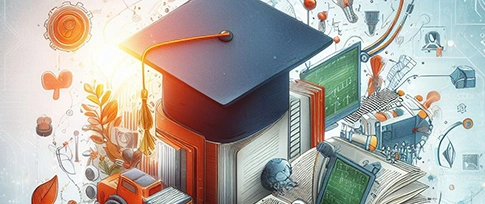
Tomorrow's Skills Today: Adapting Higher Education to the Future Job Market
Amidst an era marked by unprecedented technological advancements, economic shifts, and evolving business models, there emerges a clarion call for education systems to realign and respond. The job market is in flux, with careers unimagined a decade ago sprouting into existence. So, how can higher education institutions prepare their students for this dynamic future?
Tracing the Arc of Change:
- The Past Paradigm: Historically, education operated in silos—students selected a discipline, mastered it, and pursued careers within its confines.
- The Disruption: The dawn of the digital age, the rise of artificial intelligence, and the globalization of industries disrupted this linear trajectory. Job roles started demanding a blend of skills, and the pace of change outstripped the adaptability of traditional education.
The Nexus of Skills for the Future:
- Digital Proficiency: Beyond just being tech-savvy, the future worker needs to comprehend, and at times even shape, the digital tools and platforms central to their field.
- Interdisciplinary Knowledge: The lines between disciplines are blurring. For instance, a biologist today may require data analytics skills to decipher complex patterns in genetic data.
- Soft Skills: As machines take over routine tasks, human-centric skills like critical thinking, creativity, and emotional intelligence gain prominence.
The Responsive Education Model:
- Curriculum Evolution: Dynamic curriculums that evolve with industry demands are vital. Courses on emerging fields like quantum computing, bioinformatics, or sustainable engineering can prep students for frontier job roles.
- Experiential Learning: Theoretical knowledge needs the complement of practical application. Internships, co-op programs, and project-based assignments offer students a taste of real-world challenges.
- Lifelong Learning: Recognizing that education doesn’t end at graduation, universities can offer modular courses, upskilling workshops, and online resources for alumni, ensuring they remain industry-relevant.
The Global Context:
- Collaborative Learning: The future job market is global. Universities fostering international collaborations, student exchange programs, and global internships equip students with a worldly perspective.
- Sustainability and Ethics: With businesses emphasizing sustainability and ethical practices, courses addressing these themes are not just trendy but essential.
Case Study – The Transformative Journey: Consider 'TechVerse University', once known for its traditional engineering programs. Recognizing the evolving job market, they introduced interdisciplinary programs blending technology, design thinking, and business strategy. They also forged partnerships with global tech giants, ensuring students gained industry insights and hands-on experience. Today, their graduates are sought after, not just as technical experts, but as holistic problem solvers.
Preparing for the future job market is not about crystal ball gazing but about fostering agility, adaptability, and a relentless quest for knowledge. Higher education institutions, standing at this crucial juncture, bear the responsibility of shaping the workforce of tomorrow. It’s a challenge, no doubt, but also an exciting opportunity to redefine the very ethos of education.




